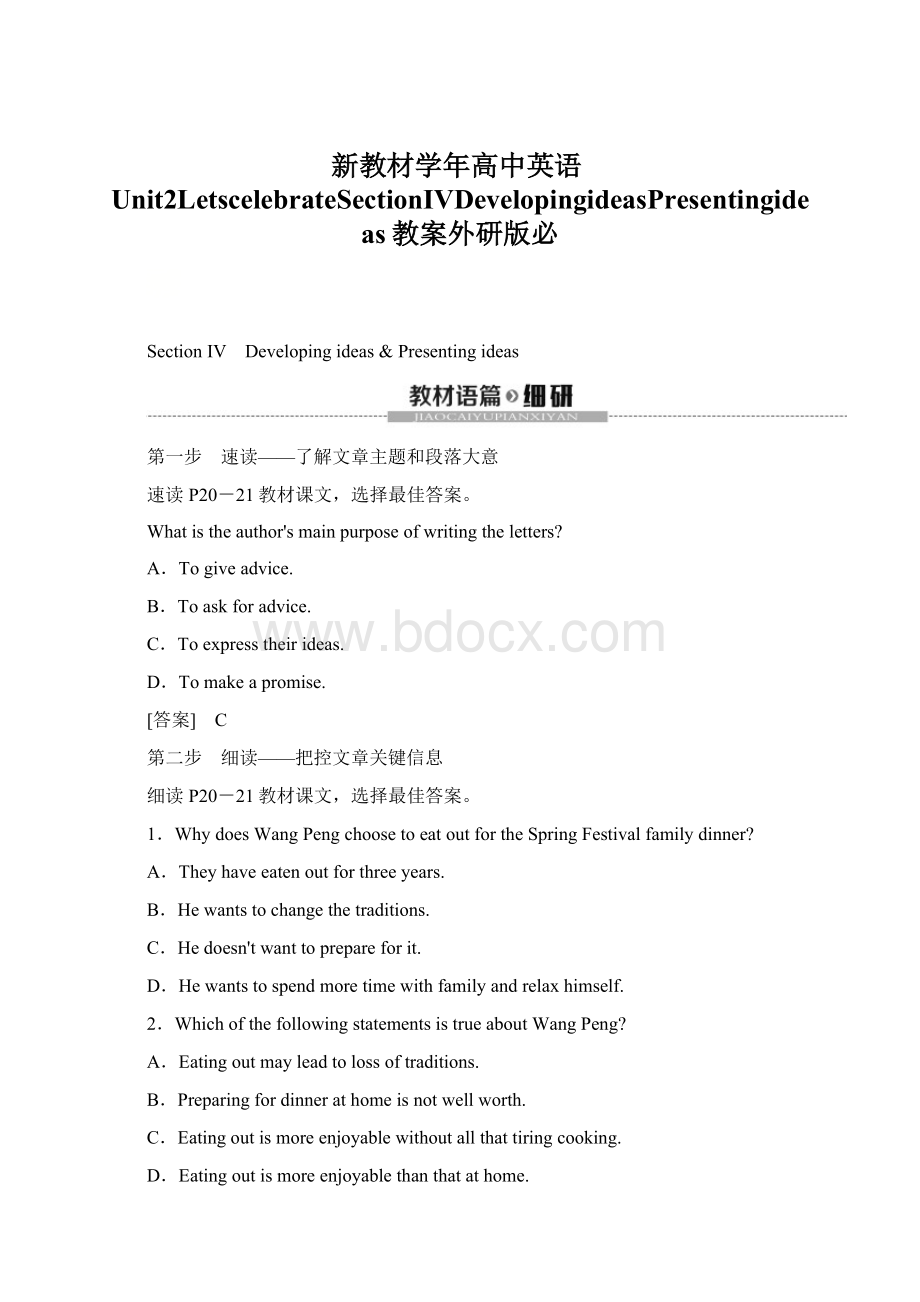新教材学年高中英语Unit2LetscelebrateSectionⅣDevelopingideasPresentingideas教案外研版必.docx
《新教材学年高中英语Unit2LetscelebrateSectionⅣDevelopingideasPresentingideas教案外研版必.docx》由会员分享,可在线阅读,更多相关《新教材学年高中英语Unit2LetscelebrateSectionⅣDevelopingideasPresentingideas教案外研版必.docx(12页珍藏版)》请在冰豆网上搜索。

新教材学年高中英语Unit2LetscelebrateSectionⅣDevelopingideasPresentingideas教案外研版必
SectionⅣ Developingideas&Presentingideas
第一步 速读——了解文章主题和段落大意
速读P20-21教材课文,选择最佳答案。
Whatistheauthor'smainpurposeofwritingtheletters?
A.Togiveadvice.
B.Toaskforadvice.
C.Toexpresstheirideas.
D.Tomakeapromise.
[答案] C
第二步 细读——把控文章关键信息
细读P20-21教材课文,选择最佳答案。
1.WhydoesWangPengchoosetoeatoutfortheSpringFestivalfamilydinner?
A.Theyhaveeatenoutforthreeyears.
B.Hewantstochangethetraditions.
C.Hedoesn'twanttoprepareforit.
D.Hewantstospendmoretimewithfamilyandrelaxhimself.
2.WhichofthefollowingstatementsistrueaboutWangPeng?
A.Eatingoutmayleadtolossoftraditions.
B.Preparingfordinnerathomeisnotwellworth.
C.Eatingoutismoreenjoyablewithoutallthattiringcooking.
D.Eatingoutismoreenjoyablethanthatathome.
3.WhyisLiuYonghuiabitunhappyaboutthathissonbookedatableatarestaurantforthisyear'sSpringFestivalfamilydinner?
A.Hethinkseatingintherestaurantmaycostalotofmoney.
B.Hethinkseatingthedinneroutwon'tfeellikeSpringFestival.
C.Hethinkseatingoutmaynotbeasenjoyableaseatingathome.
D.Hethinksthedishesintherestaurantmaytasteterrible.
4.WhichisNOTthebenefitofeatingathomeaccordingtoLiuYonghui'sview?
A.Itmakeshimhavemoredeliciousfood.
B.Itgivesthewholefamilyachancetogathertogether.
C.Itmakeshimrunaroundthehouse.
D.Itletshimtastethehomemadedishes.
[答案] 1-4 DCBA
第三步 研读——能力升华 接轨高考
根据P20-21教材课文,在空白处填入一个适当的单词或括号内单词的正确形式。
Therearetwodifferentopinionsabout1.whetherweshouldhavethedinnerinarestaurantorathome2.onSpringFestivalEve.
WangPengthinkswehadbettereatoutfortheSpringFestivalfamilydinner.Becausethe3.preparations(preparation)forthedinnerarehardwork,anditisnotreallyworththeeffortof4.spending(spend)somuchtimepreparingforasinglemeal,andthenanotherhourcleaningupthemessafterit'sover.Itwillbe5.better(good)ifwespendthetimewithfamilyandrelaxourselves.Healsothinkseatingouthasnothing6.todo(do)withlossoftraditions.Regardlessofwhatandwhereweeat,thelovebetweenthefamilynumbers7.sitting(sit)aroundthetabletogetherremainsthesame.
However,LiuYonghui,a8.retired(retire)teacher,preferstohavethedinnerathomeratherthaneatout.Hethinkseatingathomeisnotonlyforthedeliciousfood9.butfortheopportunitytohavethewholefamilygatheredtogethermeanwhile.
Intheendhe10.hopes(hope)hischildrenandtheirchildrenwillstillvaluethememoriesofpreparingthedinnertogether.
Ⅰ.单词拼写
根据汉语或首字母提示,写出下列单词。
1.Headmitted(承认)thathetookmybagbydesign.
2.Hesparednoefforts(精力)tohelptheoldmanwhowasillinhospital.
3.Whatyousaidontheoccasion(场合)wasnotproper.
4.Inmyopinion(看法),youshouldparticipateinthegame.
5.Ithinktheprocessoflearningisevenmoreimportantthantheresultatlast.
6.Allthechildrenmustbeaccompaniedbytheadultsiftheywanttoseethefilm.
7.Doyouknowhowlongthehumanbeingshaveexisted.
8.Everyonecantakepartinthecompetitionregardlessoftheirnationalityandskincolour.
Ⅱ.拓展词汇
根据词性和汉语提示,写出下列单词。
1.admitv.(不情愿地)承认→admissionn.承认
2.retirev.退休;离职→retiredadj.退休的
3.globen.地球,世界→globaladj.全球的,全世界的
4.nationn.国家;民族→nationaladj.国家的,民族的→nationalityn.国籍;民族
Ⅲ.补全短语
根据提示补全下列短语。
1.bekeenon喜爱……,对……着迷
2.nolessthan不比……少
3.preparefor为……做准备
4.inone'sopinion在某人看来
5.lookforwardto期盼;渴望……
6.havesth.done让/请某人做某事
7.feellike喜欢,想要
8.what'smore而且
9.sellout卖光
10.ratherthan而不是
Ⅳ.选词填空
选用上述短语的适当形式填空。
1.Heisnotkeenonbeingtoldwhattodo.
2.HewaspreparingfordinnerwhenIgottohishome.
3.Inmyopinion,eatingoutmaysavealotoftime.
4.I'mlookingforwardtoreceivinghispresentforChristmasDay.
5.Iwouldliketohavemybookdeliveredtomyhouse.
6.Ticketsforthefilmwassoldoutwhenwearrivedatthecinema.
7.Weshouldhelphimratherthanaskhimforhelp.
8.Doyoufeellikewalkingtherewithme?
背教材原句
记句式结构
仿写促落实
1....butnoteveryoneiskeenonthisidea.
……但是并不是每个人都喜欢这个观点。
not与everyone构成部分否定
EveryoneisnotveryrichinAmerica.
在美国并不是人人都很富有。
2.Itwasnotonlyforthedeliciousfoodthatweseldomgottoeat,butfortheopportunitytohaveourwholefamilygatheredtogether.
它不仅是为了我们过去很少吃到的美食,而且是为了让全家人聚在一起的机会。
①notonly...but(also)引导的句子
②havesth.done,done为过去分词作宾语
Eatingtogethernotonlyletsusenjoythedeliciousfoodbutalsohasthewholefamilygatheredtogether.
聚餐不仅让我们享受了美食而且还让全家人聚在了一起。
3.What'smore,notonlyaretheseattendedandenjoyedbyChinesecitizenslivingabroad,butbymanyothernationalities,too.
而且,这些(活动)不仅被生活在国外的中国市民参加和喜欢,而且也被很多其他国籍的人参加和喜欢。
notonly位于句首句子用部分倒装
Noonlydidhetakepartinthegame,butalsogotthefirst.
他不仅参加了这个游戏而且还得了第一名。
4.ItseemsthatChineseSpringFestivalisbecomingaglobalcelebrationofjoyandlove.
看起来中国的春节正逐渐变成一场全球的欢乐和爱的庆典。
在Itseemsthat从句中,it作形式主语,真正的主语是that引导的从句
Itseemedthathehadpassedtheexam.
看起来他好像已经通过这场考试。
admitv.(不情愿地)承认
(教材P20)Can'ttheyadmitthatthepreparationsforthedinnerarehardwork?
难道他们不承认准备晚饭是艰苦的工作吗?
(1)admit(doing/havingdone)sth.承认(做过)某事
admit(tosb.)that...(向某人)承认……
admitsb./sth.tobe承认某人/某物是……
(2)admitsb.to/into...准许某人进入(或加入)……
beadmittedto/into...被允许进入/接受……
beadmittedas...作为……被接受
①Thishallcanadmit1,200people.
这个礼堂能容纳1200人。
②Sheadmittedhavingbroken/breakingthewindow.
她承认打破了窗户。
③Youmustadmitthetasktobe(be)difficult.
你得承认这个任务是艰巨的。
④Studyhardandyou'llbeadmitted(admit)toakeyuniversity.
努力学习,你会被重点大学录取的。
existv.存在,实际上有
(教材P22)Afactissomethingthatexistsorhashappened,...
事实就是那些存在或已经发生的事,……
(1)
(2)
(3)existingadj. 目前的;现存的
①Hecouldhardlyexistonsuchalowwage.
他很难靠这么低的工资生存。
②Thereexists(exist)agoodwaytosolvetheproblem.
有一个解决这一问题的好办法。
③DoyouknowwhenthenewMarriageLawcameintoexistence(exist)?
你知道新《婚姻法》是什么时候实施的吗?
(教材P21)Itwasnotonlyforthedeliciousfoodthatweseldomgottoeat,butalsofortheopportunitytohaveourwholefamilygatheredtogether.
它不仅是为了我们过去很少吃到的美食,而且是为了让全家人聚在一起的机会。
(1)【要点提炼】 notonly...but(also)...“不但……而且……”,连接并列成分。
1)用于连接两个表示并列关系的成分,着重强调后者,其意为“不仅……而且……”;其中的also有时可以省略。
2)若连接两个句子,且notonly位于句首时,notonly后面的句子要用部分倒装。
3)若连接的两个成分作主语,其谓语动词的数通常与靠近的主语保持一致。
①Asanativespeaker,InotonlycanspeakMandarinfluently,butalsoknowhowtoworkonittomakegreatprogress.
作为一个说本族语的人,我不仅能说流利的普通话,而且知道如何努力取得很大的进步。
②Notonlycantheyofferusjoyandexcitement,butalsotheycanencourageustothinkcritically.
它们不仅能给我们带来快乐和兴奋,而且还能鼓励我们进行批判性的思考。
③Notonlythestudentsbutalsotheirteacherlikes(like)playingfootball.
不仅是学生,老师也喜欢踢足球。
(2)【要点提炼】 “havesth.done”意为让某人做某事,或某物遭受了/被……了,其中sth.与done之间是被动关系。
done为过去分词作宾语补足语。
havesb./sth.doingsth.让某人做某事/让某事发生(动作持续)(肯定句)
havesb.dosth.让某人做某事
havesth.done让别人做某事;完成某事;遭遇不幸的事
havesth.todo有事情要做(不定式作定语)
④Ican'thaveyouspeakingtoyourmotherinarudemanner.Youmustapologizetoherimmediately.
我不允许你用那种粗鲁的方式跟你的母亲说话。
你必须立刻向她道歉。
⑤Hehadhiscarrepairedyesterday.
他昨天请人修车了。
⑥Sorry,butIhaveanimportantmeetingtoattend(attend).
对不起,我有个重要的会议要参加。
⑦Theyarehavingtheirhousesmended(mend)now.
现在他们正在修理房子。
(教材P23)ItseemsthatChineseSpringFestivalisbecomingaglobalcelebrationofjoyandlove.
看起来中国的春节正逐渐变成一场全球的欢乐和爱的庆典。
【要点提炼】 本句为“it+动词+that从句”,it作形式主语,真正的主语为that从句。
Itmattersthat从句 某事很重要
Itappearsthat从句似乎……
①Itdoesn'tmatterwhetherhewillcometoattendthemeetingornot.
他是否来参加本次会议不重要。
②Itappearsthattheyhavemade(make)thesamemistake.
似乎他们犯了同样的错误。
1.(教材P21)WhenIwasalittleboy,thedinnerontheeveofSpringFestivalwaswhatIlookedforwardtomost.
【分析】 本句是复合句,when引导一个时间状语从句,在主句中又有一个what引导的从句作was的表语。
另外ontheeveofSpringFestival是介词短语作定语修饰thedinner。
【翻译】 当我还是小男孩时,除夕的晚餐是我最盼望的。
2.(教材P21)Iwouldrunaroundthehouse,listeningtotheadultschattingabouttheiryear.
【分析】 listening在本句中为现在分词作伴随状语,表示与谓语动词runaround的动作同时发生,而chatting是现在分词作宾语补足语。
【翻译】 我常常在屋子里跑来跑去,倾听大人们聊聊他们的那一年。
如何写建议信
本单元的写作项目属于新课标中应用体类别中的“建议信”。
这种题目要求我们就有关问题进行分析,并针对这些问题提出自己的看法和建议。
一、基本框架
1.开头(beginning)——开门见山,向对方陈述自己的观点(stateyouridea)。
2.主体(body)——对所提出的问题进行分析并说明理由,接着提出自己的建议(reasonsandevidence)。
3.结尾(ending)——呼应开头,重申观点(restateyouropinion)。
二、注意事项
1.开门见山,直入主题。
在书信正文的开头找准话题的切入点,自然而然地引出自己想要谈的主题。
写信时要充分了解情况,有的放矢,以提高书信的针对性。
2.给出希望对方采取或者终止某种行为的理由。
在陈述理由的过程中要换位思考,尽量为对方考虑。
要用事实说话,以增强说服力。
3.语气要和缓,让对方考虑你的想法或者建议,以理服人是关键,不能把自己的想法强加于人。
4.给出合理建议,通过提建议让对方明确行动的方向,从而达到写信的最终目的。
常见精彩开头:
1.I'msorryyouhavetroublein...
2.Iamwritingtosharesomeadvicewithyou.
3.Youhaveaskedmeformyadviceabout...
4.Iamwritingtoexpressmyviewson/concerning...
5.Youhaveaskedforsomeadviceconcerning...andIwilltrytogiveyoumysuggestion.
提出建议时常用的句型:
1.Ithinkitwouldbeagoodideaif...
2.Inmyopinion,itwouldbewiseto...
3.Isuggestthatyoushould...
4.Inmyopinion,you'dbetter...
5.Iadviseyouto...
6.IfIwereyou,Iwould...
7.Whynot...?
/Whydon'tyou...?
8.Howabout...?
/Whatabout...?
结尾段常用的句型:
1.Ihopeyouwillfindtheseproposals/suggestions/tipspractical/useful/helpful.
2.Iwouldbereadytodiscussthismatterwithyouinmoredetails.
3.Iwouldappreciateitverymuchifyoucouldconsidermysuggestions.
4.Intheend,Iwillbegladifyoufindmysuggestionsuseful/helpful.
5.Ihopeyouwilltakemyadviceintoaccount.
6.Iwillbegladifyouwillconsidermytips.
你的英国朋友Jim所在的学校要组织学生来中国旅行,有两条线路可以选择:
“长江之行”或者“泰山之旅”。
Jim来信希望你能给些建议。
请你给他回信,内容包括:
1.你建议的线路;
2.你的理由;
3.你的祝愿。
注意:
1.词数80左右;
2.开头和结尾已给出,不计入总词数。
DearJim,
___________________________________________________________________
__________________________________